Moving Traditions and Rituals Around the World
Moving homes, whether across the street or to a different country, is a significant life event. But did you know that various cultures have unique traditions and rituals associated with relocating? In this article, we’ll explore these fascinating moving customs from around the globe. Understanding moving traditions and rituals around the world not only offers a glimpse into diverse cultures but also underscores the universal significance of the moving process. As the relocation industry continuously evolves, Idaho movers and other professionals in the field can draw inspiration from these customs, adapting and enhancing their services to cater to a global clientele.
Exploring Moving Traditions and Perspectives Across the Globe
Each cultural interpretation reflects the things unique to the people who embrace this transformative journey. These interpretations enrich the collective human experience and primarily focus on the following:
- Values
- Aspirations
- Historical narrative
The simple process of booking moving services Boise ID residents need actually mirrors an essential service recognized universally. Moreover, the significance of moving to different societies extends beyond the physical aspect of relocation.
Cultural Interpretations of Moving and Its Significance in Diverse Societies
As a universal phenomenon, moving takes on diverse cultural interpretations, each infused with unique significance in different societies. It symbolizes growth, adaptation, and the acquisition of wisdom as individuals venture into new territories. In contrast, certain communities view moving as a communal event. They emphasize the collective bonds shared among families or entire tribes as they migrate together.
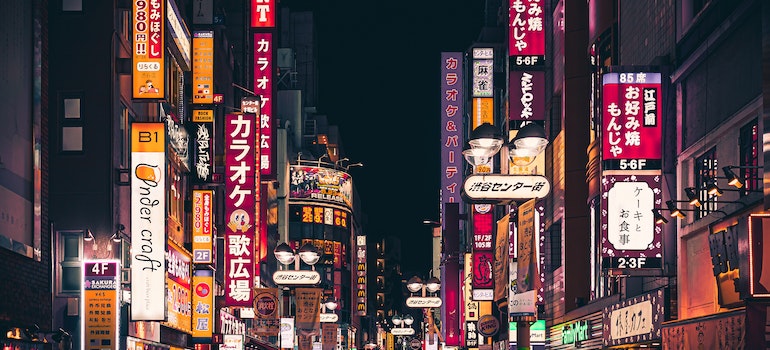
Furthermore, the act of moving can hold economic and social implications. In modern societies, migration often takes place due to economic aspirations. Individuals and families are seeking better job prospects and improved living conditions in new locations. In these instances, moving becomes a reflection of the pursuit of prosperity and determination to create a brighter future.
Nomadic Legacy: Unraveling Moving as a Universal Human Activity
Moving, in its various forms, emerges as a universal human activity transcending borders and time periods. From ancient nomadic tribes to modern-day migrations, the act of moving has been an essential aspect of human existence. Whether for survival, exploration, or seeking better opportunities, the inherent urge to move has shaped the course of history. It also influenced the development of societies across the globe.
Sacred Homecomings: Unveiling Asian Moving Traditions and Rituals
Across Asia, these moving traditions and rituals exemplify the profound reverence and respect for the spiritual connection between individuals and their homes. Coming from centuries of wisdom, these practices continue to be cherished by millions. They perpetuate the sacred harmony that enriches the Asian way of life.
Chinese Moving: Auspicious Dates, Feng Shui, and Abundant Beginnings
Just as you would carefully select a moving date with the local movers Boise residents use, ancient Chinese traditions placed great emphasis on choosing auspicious dates for moving to ensure good fortune. The art of choosing a favorable moving date is guided by ancient Chinese almanacs, which consider astrological factors, the Chinese zodiac, and the alignment of stars.
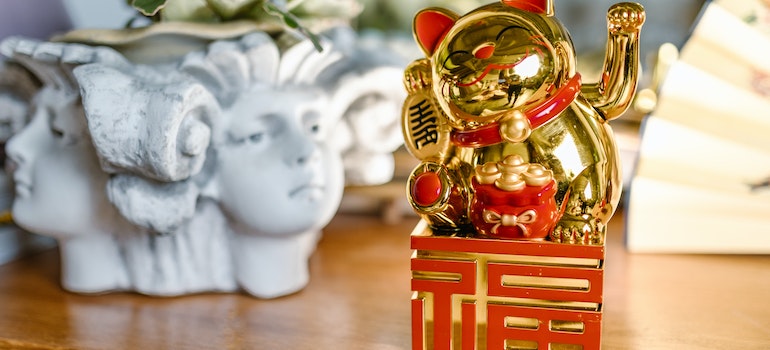
Additionally, Feng Shui, an integral part of Chinese culture, plays a vital role in the moving process. Before arranging furniture and decor, a Feng Shui master may be consulted to ensure the optimal flow of positive energy (Qi) throughout the new space. This ancient practice aims to create a harmonious environment that fosters balance, health, and happiness for the occupants.
Japanese Housewarming: Purifying with Salt, Embracing Spiritual Harmony
In Japan, moving into a new home is accompanied by the traditional ‘salt purification’ ritual, known as “Shubatsu.” The ritual involves sprinkling salt at the entrance and throughout the house. It symbolizes purification and the warding off of evil spirits. A Shinto priest or a family member usually conducts Shubatsu. Moreover, during this ritual, prayers are offered for protection, good luck, and harmony in the new home. The ceremony fosters a sense of tranquility and reverence for the sacredness of the living space, marking the beginning of a new chapter in the family’s life journey.
Indian Vastu Shastra: Cosmic Alignment for a Prosperous Home Transition
In India, moving into a new home is guided by the ancient Vastu Shastra principles. These principles dictate the layout and orientation of the living space to ensure alignment with cosmic energies and natural elements. Vastu Shastra, similar to Feng Shui, seeks to harmonize the flow of positive energy within the home, promoting prosperity, health, and spiritual well-being.
Before moving in, a Vastu expert is often consulted to assess the property and suggest necessary adjustments. The primary point of these adjustments is the enhancement of the energy balance. Key considerations may include the placement of rooms, doors, and windows, as well as the direction in which the main entrance faces.
African Moving Traditions and Rituals Celebrate Heritage and Spirituality
In Africa, the journey of moving is more than a change of residence; it is a celebration of heritage, spirituality, and human connections, echoing through the ages as a testament to the continent’s diverse and profound cultural legacy.
Ijaw Tribe’s Vibrant Tradition: ‘Yawning the House’ for Communal Unity and Cultural Celebration
Among the lush landscapes and waterways of Nigeria’s Niger Delta, the Ijaw tribe practices a unique and fascinating tradition known as “yawning the house.” When a family or individual moves into a new dwelling, they gather their loved ones. Together, they sing songs, recite blessings, and perform rhythmic dances as they ceremoniously “yawn” the house open.
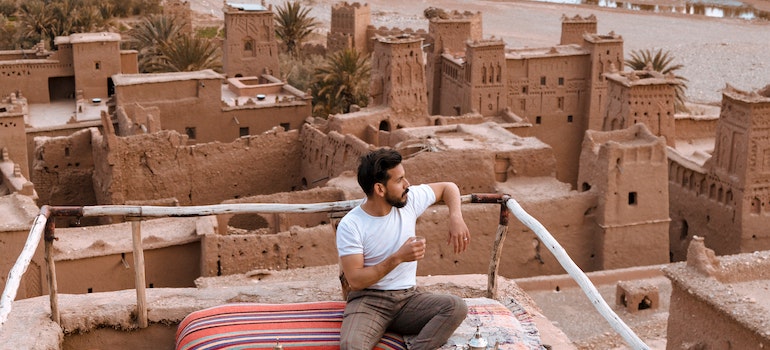
The act of “yawning” symbolizes the home’s official opening, welcoming guests, friends, and relatives to visit and share in the family’s happiness. As the community celebrates this auspicious occasion, they offer gifts and well-wishes, contributing to the household’s new beginnings.
Zulu Culture’s Ukwemula: Inviting Ancestors to Embrace a New Home with Reverence
The ritual of Ukwemula holds deep meaning for the Zulu people. It strengthens their connection with their ancestors and roots. During this solemn ceremony, the family gathers around a special area in the new home. Also, a designated elder offers prayers and invocations to introduce the ancestors to the dwelling. The elder sprinkles “isiphepho,” a traditional herb with purifying properties, to cleanse and sanctify the space.
Morocco’s Dakka Marrakchia: Blessing New Homes with Spiritual Splendor
The ceremony commences with recitations from the Quran, invoking divine blessings upon the household and its inhabitants. Traditional music and dance, characteristic of the Dakka Marrakchia, fill the air, further enriching the celebratory atmosphere. The Imam bestows prayers of prosperity, harmony, and protection upon the new dwelling, ensuring a blessed start to the family’s new chapter.
Moving Traditions Across Europe
European moving traditions and rituals epitomize the beauty of cultural diversity. They infuse the experience of moving with meaning and significance that transcends time and borders.

Drawing parallels with the Irish tradition of leaving a loaf of bread and a new broom in the new house for good luck, modern-day moving boxes Boise locals pack with specific essentials for a comfortable first night in a new place.
Irish Abundance and Renewal: Leaving a Loaf of Bread and a New Broom
In the landscapes of Ireland, the act of moving carries a set of customs deeply rooted in folklore and superstition. When a family or individual relocates to a new home, an age-old tradition entails leaving a loaf of bread and a new broom at the doorstep. The loaf of bread symbolizes abundance and a wish for never-ending sustenance in the new dwelling. On the other hand, the new broom represents a fresh start, sweeping away any lingering misfortune or negative energy.
Russian Guardianship: Welcoming a Cat as the First House Guest
In the vast expanse of Russia, moving into a new home is accompanied by a curious and fascinating custom: allowing a cat to be the first to enter the premises. This centuries-old belief stems from Russian folklore, which suggests that cats possess a special ability to sense and ward off malevolent spirits. By allowing a cat to explore the new dwelling first, inhabitants seek protection and blessings, ensuring that their home remains safe from supernatural disturbances.
Scandinavian Household Guardians: Embracing the Tomte Tradition
Across the enchanting landscapes of Scandinavia, the tradition of “Tomte” endures, embracing the belief in household spirits that safeguard homes and their inhabitants. Derived from Norse mythology, the Tomte is a benevolent, gnome-like creature known to be a guardian of the household. When families move into a new dwelling, it is customary to leave a small offering, such as a bowl of porridge. The point of this custom is to welcome and appease the Tomte, inviting its presence and protection.
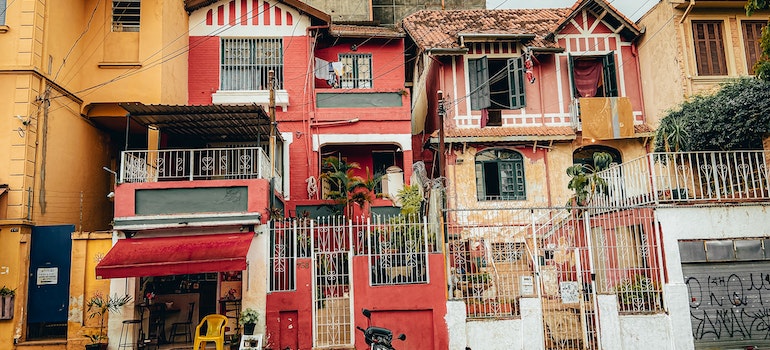
Moving Traditions and Rituals Across the Americas
As diverse as the landscapes that stretch across the Americas, these moving traditions encapsulate the beauty and spiritual significance that come with transitioning into a new living space. Additionally, they showcase the importance of ways in which sacred practices enrich the experience of moving into a new home.
While Latin American traditions often involve lighting a white candle to repel bad energy in a new home, in contemporary relocation practices, professional furniture installation services play a significant role in setting up a welcoming and functional space in the new dwelling.
Latin American Tradition of Lighting a White Candle in New Homes
In the vibrant tapestry of Latin American traditions, moving into a new home is marked by a beautiful and symbolic ritual. As families step into their new abode, they bring with them a time-honored practice of lighting a white candle to repel negative energy and invite blessings. The lighting of the candle is a spiritual gesture, signifying hope, purity, and the guidance of a brighter future. In this cherished tradition, the flickering flame illuminates the path ahead, driving away any lingering darkness from the past.
Native American Smudging Ceremony for Cleansing New Dwellings
This centuries-old ritual, conducted by tribal elders or spiritual leaders, centers around the sacred use of cleansing smoke. The smoke typically derives from sage or other medicinal herbs. As the smoke wafts through every corner of the house, it purifies the space. It is also supposed to get rid of any lingering negative energy and harmonize it with nature’s elements.
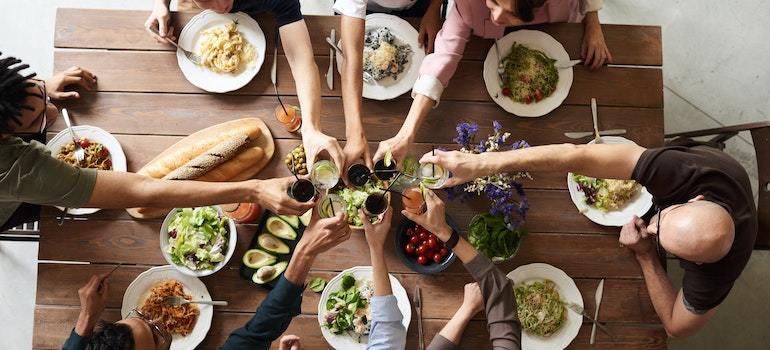
USA’s Unique Moving Traditions – Haint Blue Porches, St. Joseph’s Statue, and Housewarming Parties
One unique tradition, originating from the Gullah Geechee community of the South, involves painting the porch ceiling blue. This practice, known as “haint blue,” is rooted in the belief that the color blue wards off malevolent spirits. It ensures that there is a protective barrier around the home.
Another American tradition associated with the process of selling a home is the practice of burying a St. Joseph statue. Legend has it that burying the statue in the yard will expedite the sale of the property. Also, it might even bring luck to the new homeowners. Finally, the most famous custom Americans tend to do is to organize housewarming parties and make a celebration. Celebrated across various cultures and regions, this joyful occasion brings together friends, family, and new neighbors together.
Cultural Diversity in Moving Traditions and Life Transition Rituals
The exploration of moving traditions and rituals worldwide highlights the remarkable cultural richness and diversity that humanity possesses. Moreover, these traditions serve as a testament to the enduring importance of rituals during significant life transitions. Whether it’s relocating to a bustling metropolis in Asia or moving to Idaho in the Pacific Northwest region of the U.S., the act of moving carries with it a host of emotions and rituals, highlighting its significance as a universal human activity.

